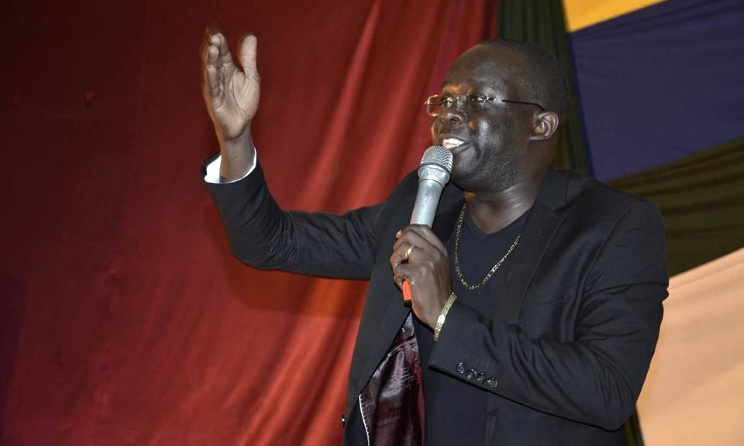South Sudanese music fights for survival
Music has become a ray of hope for the many South Sudanese men, women and children who are exiled or living in refugee camps amid the country’s ongoing civil war.
 MC Lumoex says many musicians have full-time jobs that support their music careers.
MC Lumoex says many musicians have full-time jobs that support their music careers. Uganda-based South Sudanese artist Silver X. Photo: Hulk
Uganda-based South Sudanese artist Silver X. Photo: Hulk
The conflict has forced almost 2.5 million people to seek refuge in Uganda, Kenya, Sudan, Ethiopia, the DRC and the Central African Republic. The UN reports that a further 2 million are displaced inside the country. Tens of thousands have been killed.
Like their fellow countrymen and women, the war has also displaced the country’s musicians, leaving just a handful of them to spread the important message of peace.
MC Lumoex is one such musician playing in the rubble of the war-torn country. He sings about South Sudan's plight without directly criticising the government, which according to a recent UN report restricts freedom of expression.
“I am conscious of the war and the effects it has on my country," he says. "I absorb what I see and transform it into songs. That's why most local musicians sing about the changes brought about by the war, and not about who is responsible for it."
Many African cities and towns are urbanising at a blistering pace and in the process forging vibrant cultural scenes. But a lack of support and infrastructure does not place the South Sudanese capital Juba in this category. The city has been enveloped in conflict since 2013 when soldiers loyal to President Salva Kiir, a Dinka, and those loyal to former vice president Riek Machar, a Nuer, clashed following months of political tension.
Last week, the Intergovernmental Authority on Development (IGAD) concluded a forum in Addis Ababa, Ethiopia, in an attempt to jump-start the peace process. The talks ended without any significant breakthrough.
MC Lumoex, whose real name is Isaac Lumori, says a moratorium on cultural development in South Sudan has forced musicians to pursue other ways to earn an income.
“All musicians here have regular jobs that give them daily income because that's the only way to survive and support their music careers in an industry that lacks structures,” he says.
Lumori is a professional telecoms engineer who has passionately self-sponsored his career and compellingly delivered messages of peaceful coexistence through his songs for the past 21 years. He says most of his music speaks about war, hate and hunger. But his music videos are poorly made and rarely aired on TV stations in the region. This is one of the reasons many South Sudanese artists travel and even relocate to neighbouring countries in search of professional recording studios and sound engineers.
Uganda-based South Sudanese dancehall artist Silver X says the quest for high-quality production has resulted in South Sudanese artists embracing the sounds of where they are based.
“As we speak a lot of our urban music bares the Ugandan rhythm because a lot of us record in Kampala,” he says. “We don’t have a common sound so everyone is experimenting with other sounds, but a majority of us sing in our traditional dialect. Personally, I work with Kenyan and Ugandan producers and only travel to Juba for concerts.”
But production quality of music is not the only technical barrier for South Sudanese musicians. MC Lumoex says the state of the country's music industry encourages artists to be playback singers.
“Staging a live show depends on the promoter," he says. "But I try as much as I can to occasionally stage live concerts. However, most people shy away from such concerts because ticket prices are costly. Organisers charge highly because they depend on ticket sales to pay for the hired equipment and the instrumentalists.”
Last year, a South Sudanese blog reported that MTV Africa has branded local musicians as the worst in Africa in terms of production. What followed was a heated debate on social media. But MC Lumoex says the rest of Africa needs to understand that the country's situation does not permit musicians to be on the same level with artists from politically stable countries.
“The truth is far more complicated,” he said. “The South Sudanese civil war is an ongoing conflict that has slowed down development in certain sectors and made it difficult for musicians to make music that can compete with artists from the region."
He says if the industry has the necessary support from the government, further issues such as music piracy and copyright infringement could be dealt with.
“In South Sudan, once you release a new song, you wake up the following day and find it being sold on the streets for less than a $1. This situation has forced many talented artists to quit the industry.”
MC Lumoex and Silver X are in agreement that while efforts are being made to bring peace to South Sudan, musicians should step up and use their influence for humanitarian purposes.
“I have used my resources to hold charity concerts to raise school fees for children at the Juba orphanage,” MC Lumoex said. “I do this because I know that musicians have a moral responsibility to serve society. I also believe that through education, children will get the knowledge and skills needed to rebuild the country once the conflict is over.”
According to a UN report released last year, at least 2 500 children were recruited as soldiers by both government and opposition forces. This number is expected to increase if the war continues.
MC Lumoex says musicians such as Dynamiq, Emmanuel Jal and the South Sudanese community in the diaspora have been assisting victims of the war. Last year, the US-based Dynamiq headlined a peace concert in Juba that was followed with the release of ‘Eyal Del’ in collaboration with various local artists. The song describes the realities children in South Sudan face on a daily basis. Its success has compelled the singer to initiate an online fundraising campaign to cover the cost of recording a peace-themed album that will feature artists from various communities in South Sudan.
Andrea Stoutland, who works with the World Food Programme, says most concerts are family events held during the day by organisations such as Anataban Campaign – an artist collective known for staging street performances to foster public discussion about the issues of social injustice and government accountability.
“Juba residents still afford a nightlife at various hangout joints," she said. "When I have time I normally attend the events held during the day because the UN has a 7pm curfew, so we can hardly do anything at night. The radio stations play South Sudanese music but our field drivers prefer Congolese and Ugandan music.”















Commentaires
s'identifier or register to post comments